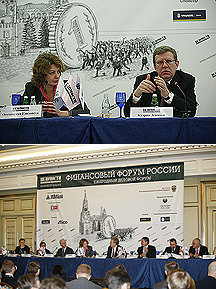Russian Financial Forum: Bubble Smaller, but not Burst

Vedomosti magazine organized the Financial Russia forum on November 25 to 26. The forum was one of this year’s largest events dedicated to discussing the economy.
The main theme for the discussion was given by Finance Minister Alexei Kudrin and Central Bank first deputy chairman Alexei Ulyukayev. They argued at the conference with Alfa Bank president Pyotr Aven and MDM Bank board of directors chairman Oleg Viyugin over what is best for the Russian economy – traditional dependence on the export of raw materials, conservative policies and financial stabilization or decisive government measures involving increased budgetary infusions into the economy to spur rapid economic growth. The debate ended with each participant holding to their original opinions.
Discussions over models of economic growth for Russia continued for two days on six different topics: Banks, Capital Markets, The World of Funds, The Insurance Market and The Club of Financial Directors. Forum participants attempted to find answers to a number of urgent questions.
During the “Banks” discussion, Alexei Simanovsky, head of the Central Bank’s regulation and supervision department, characterized the lesson learned from the credit boom that took hold of the Russian economy several years ago by recalling the proverb, “Better to have bread with water, than sweet cake with troubles.” UniCredit Bank chief executive officer Mikhail Alekseyev added that the aftershocks of the credit boom will hit very soon – in the form of an increase in overdue debt in the banking system. That is fraught with the most negative consequences for the economy considering that it will limit the resource base of banks. This is happening in part because the capital market is not working at full force and the rules of the game needed to effectively regulate financial markets will only come into force in January, after which they will stabilize the situation. So promised head of the Federal Financial Markets Service Vladimir Milovidov.
Troika Dialog board of directors chairman Pavel Teplukhin suggested that the government was primarily busy “putting out fires” during the crisis in order to save the banking system. At the same time, very little attention was given to the only long-term investors in the Russian economy – nongovernmental pension funds, co-op share funds and other similar institutions. It is necessary to understand how “long” pension funds – so urgently needed by the economy – should be invested. “Today we see that the existing opportunities for pension funds do not correspond to the task faced by those responsible for investing them,” said Teplukhin. “Pension funds are ‘long’ and the instruments available for their allocation are ‘short.’ It is necessary to expand the range of instruments available to management companies for investing pension funds,” he said. Members of professional societies attending the “World of Funds” and “Capital Markets” sessions agreed with his assessment.
However, during the interim when that has yet to happen, banks have cut back on credit issued to the real sector of the economy and some companies cannot service their debts according to the terms to which they earlier agreed. Participants in the “Financial Directors’ Club” session discussed strategies for combating the crisis under conditions of insufficient credit resources. AutoSpecCentre Group financial director Oleg Moseyev recommended keeping a positive focus. Azbuka Vkusa financial director Viktoria Lubina examined the advantages and disadvantages of using various letters of deposit and debt instruments during the crisis.
Sergei Aleksashenko, director of the Development Center of the Higher School of Economics, concluded that the bubble has lost some air, but hasn’t burst. The economic situation has normalized a bit, but many problems remain unsolved: high credit rates and an increase in administrative pressure will hamper recovery. Many participants in the Russian Financial Forum shared his view. Finance Minister Alexei Kudrin promised representatives of the business community to return to these themes in one year.

